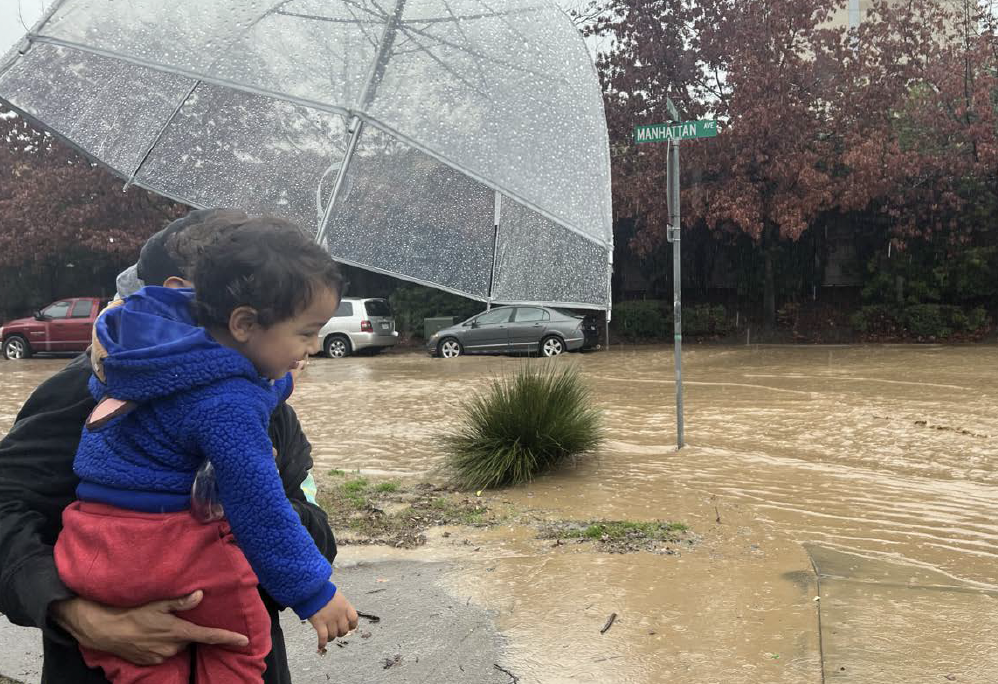East Palo Alto Rain Garden Project – Centering communities in resilience-building

Summary
Climate Resilient Communities, in collaboration with HighTide Intelligence, Grassroots Ecology, and FreshApproach received a grant from the California Coastal Conservancy to install 25 rain gardens and water cistern systems for low-income homeowners in East Palo Alto, all at no-cost. This project emerged out of an extensive community engagement process including extended focus groups with residents, door-to-door solicitation and surveying, and several community workshops, all to assess East Palo Alto’s vulnerability to climate change and community priorities for response. Rain gardens were suggested by the community as a Nature-based Solution to the harms of climate change that offers multiple compounding benefits.
This case study is an abridged case from the original text in the report Adapting Coastal Cities and Territories to Sea Level Rise in North America – U.S. West Coast: Challenges and Leading Practiceswhich can be downloaded from that weADAPT article. Please access the original text for more detail, research purposes, full references, or to quote text.
Objectives
- Reduce stormwater and riverine flooding impacts with decentralized Nature-based Solutions by creating more permeable opportunities for water to naturally be absorbed.
- Prevent displacement by improving property values and reducing risks of catastrophic loss during flood events. Property owners without mortgages often bear the risk of flooding without flood insurance, which has historically fueled displacement in East Palo Alto.
- Promote household resilience by creating food and water sovereignty to a community disproportionately burdened by the high costs of fresh food and water allocations.
- Determine the potential for scaling rain gardens through rigorous modelling and conduct a cost -benefit analysis to advocate for project expansion.
Activities
Widespread community education, outreach and public engagement are key components of this project, which will raise awareness about the benefits of Nature-based Solutions. Several modelling exercises will be conducted to ensure optimal placement of gardens at household level as well as the scaling necessary to impact flood risk at community level. Native plants and edible species will form a plant palette specific to the conditions of each site and garden ambassadors will be recruited and trained to install and maintain nature-based infrastructure and water cistern systems. Continuing employment and upkeep of the gardens will provide opportunities for 10 community members to develop transferable skills and earn prevailing wages.
Outcomes and Impacts
The projech has resulted in:
- 10 Garden Ambassadors trained and employed
- 25 rain gardens and water cistern systems installed
- 500 residents engaged through educational workshops and outreach activities
- 1 journal article or white paper outlining best practices
- modeling results making the case for widespread, decentralized, Nature-based Solutions to climate change
Lessons Learnt
- The East Palo Alto Rain Garden Project has been community-led from the start bringing a diverse set of community voices into conversation about their priorities for climate adaptation at the local level, which facilitated buy-in and the recruitment of participants.
- Residents strongly support this project, in part because of the immediate and tangible impacts it will provide. In addition to workforce development, a key community priority – residents recognize the tremendous value this project can play in reducing displacement.
- Project management and administration has been very coherent, due in large part to strong, pre-existing relationships between collaborators. Shared goals of community resilience and commitment to local communities unified the team around the project.
Suggested Citation:
The case study is taken from the following report. Please use the following citation: Ocean & Climate Platform. (2023). Adapting Coastal Cities and Territories to Sea Level Rise in North America – U.S. West Coast: Challenges and Leading Practices. Ocean & Climate Platform. 56 pp.
Related resources
- Results and impacts of the UCSC Coastal Resilience Lab – Valuing risk reduction services provided by coastal ecosystems
- Resilient Coast Santa Cruz: Cross-sector collaboration for long-term resilience
- Urban Green Infrastructure: An Introduction
- Coastal community based adaptation in Bangladesh
- Assessing and Adapting to the impact of weather events at the Royal Botanic Garden Edinburgh
(0) Comments
There is no content